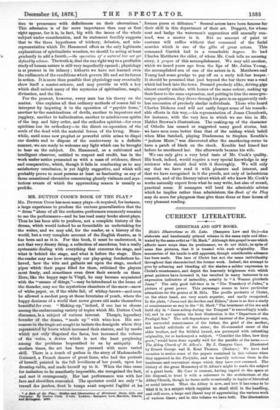MR. DUTTON COOK'S BOOK OF THE PLAY.*
Mn. DurroN COOK has-seen many plays—it required, for instance, a large experience to produce the curious generalisation that the " drum " alone of all the orchestra-performers commonly remains to see the performance—and he has read many books about plays. Thus he has been able to produce, not a complete history of the drama, which would indeed be as formidable an undertaking for the writer, and we may add, for the reader, as a history of the world, but a very complete account of the English theatre, as it has been and as it is. For this book, it must be understood, is not that very dreary thing, a collection of anecdotes, but a really systematic dealing with everything that concerns the stage, and what is behind the stage, and what is before the stage. Here the reader may see how strangely our play-going forefathers be- haved, how the wits and gallants sat upon the stage, smoked pipes which their pages filled for them, criticised the players most freely, and sometimes even drew their swords on them. Here, like the happy sage in Virgil, he may become acquainted with the "causes of things,"—may be introduced to the home of the thunder, may see the mysterious chambers of the snow—snow of white paper, or, if the white fail, of whitey-brown—and even be allowed a modest peep at those fountains of youth, where the happy denizens of a world that never grows old make themselves beautiful for ever. "Making-up," indeed, if one has to choose among the embarrassing variety of topics which Mr. Dutton Cook discusses, is a subject of curious interest. Thespis, legendary founder of the drama, "made up" with wine-lees. His suc- cessors in the tragic art sought to imitate the demigods whom they represented by boots which increased their stature, and by masks which not only disguised the faces, but increased the volume of the voice, a device which is not the least perplexing among the problems bequeathed to us by antiquity. In modern times, the art has been pursued with more varied skill. There is a touch of pathos in the story of Mademoiselle Gnintard, a French dancer of great fame, who had the portrait of herself, painted in the full loveliness of her youth, upon her dressing-table, and made herself up to it. When the time came for imitation to be manifestly impossible, she recognised the fact, and met it courageously. Her last performance was with her face and shoulders concealed. The spectator could see only "le travail des jambes, dont le temps avait respecte ragilite et lea * 4 nook of the Play: Studies and Illustrations of Histrionic Story, Life, and Character. By Dutton Cook. 2 vole. London : Sampson Low, Marston, Searle, and Bivington. 1815. formes ptires et delicates." Several actors have been famous for- their skill in this department of their art. Doggett, for Whose coat and badge the watermen's apprentices still annually con- tend, was a master in it. But no amount of paint or costume will suffice without that command of the facial muscles which is one of the gifts of great actors. This command Garrick had in a remarkable degree. So had Charles Matthews the elder, of whom Mr. Cook tells an amusing story, II propos of this accomplishment. We may add another, which we heard years ago from the lips of Mr. Julian Young, the accomplished son of one of the actors in it. Matthews and Young had some grudge to pay off on a surly toll-bar keeper. • It should be premised that just beyond the bar there was a road which led back into the town. Dressed precisely alike, driving gigs almost exactly similar, with horses of the same colour, making op. their faces to the same expression, and putting to him the same gro- tesque questions, they drove through his gate in an apparently end- less succession of precisely similar individuals. Those who heard Charles Dickens read will not easily forget some of his remark- able efforts in this way,—his representation of Jonas Chuzzlewit, for instance, with the very face in which we see him in Mr.. Hablot Browne's illustrations. The making-up of the character- of Othello has caused or suggested many good stories, but we have seen none better than that of the mishap which befell when Miss Satchell, playing Desdemona to Stephen Kemble's "jealous Moor," was discovered after the smothering-scene to. have a patch of black on the cheek. Kemble had kissed her before he smothered her. She afterwards became his wife.
We can only give a very brief taste of Mr. Cook's quality. His book, indeed, would require a very special knowledge in any reviewer who should deal with it thoroughly. We will only say that we have read it with pleasure and interest, and that we have recognised in it the proofs, not only of industrious, research, and of the literary talent which all who know Mr. Cook's. works naturally expect from what he may write, but also of sound, practical sense. If managers will heed the admirable advice which he implies rather than administers, the Book of the Play may do more for playgoers than give them three or four hours of very pleasant reading.


































 Previous page
Previous page